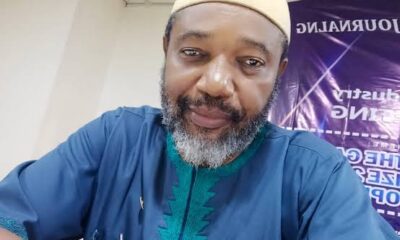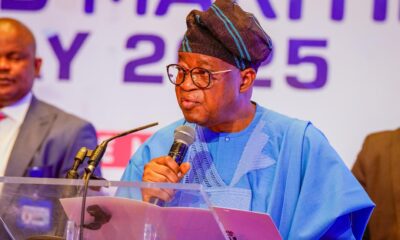Health & Fitness
Mile 2 Pollution: SEREC Calls for Reform in Nigeria’s Barge Operations

BY GB OGBOWA GBOWA
A recent environmental crisis at the Mile 2 Jetty in Lagos has ignited a powerful call to action from the Sea Empowerment and Research Center (SEREC), urging the Nigerian government to overhaul the nation’s barge operations under the Ministry of Marine and Blue Economy.
Following the sinking of a barge and subsequent chemical leakage into the waterways—exacerbated by relentless rainfall—SEREC warns of escalating threats to marine life and public health. The group said verified reports from Harboursandport.com reveal that industrial chemicals stored at Clarion Shipping Terminal have been seeping into surrounding waters, with no visible regulatory response.
SEREC describes the incident as a “critical wake-up call,” exposing the fragmented and weak coordination among agencies responsible for barge operations. The organization is now advocating for the immediate creation of a Directorate of Barge Operations and Logistics Services (DBOLS) to centralize oversight and enforce safety, environmental, and operational standards.
SEREC proposes that the new directorate should do the following:
*Mandate registration, inspection, and certification of all barges and tugs.
*Set national safety and environmental standards for barge design and operations.
*Deploy vessel tracking systems (AIS/GPS) for inland waterway monitoring.
*Supervise terminal licensing, accident reporting, and pollution control.
*Drive training, certification, and job creation in marine logistics.
This is even as the group outlined the expected economic and employment potential in the sub sector. It recommended the following economic model:
-Setup Cost: ₦8–10 billion (USD 5.5–6.5 million) for staffing, digital systems, and safety equipment.

-Annual Revenue: ₦60–80 billion (USD 40–50 million) from vessel fees, cargo levies, and environmental charges.
-Job Creation: 45,000–60,000 new jobs over 3–5 years, spanning technical, dockside, and supply-chain roles.
-Investment Attraction: ₦250–300 billion (USD 180–200 million) in private sector investment over the next decade.
On the proposed environmental benefits, SEREC highlights that every 100 cargo-laden barges could remove 1,000 trucks from highways—cutting road maintenance costs and reducing CO₂ emissions by up to 30% annually.
Drawing inspiration from global leaders in inland waterway logistics, SEREC referenced the following nations:
India’s IWAI: 111 national waterways, 100,000+ jobs.
U.S. Army Corps of Engineers: USD 3 billion budget for safe navigation.
Netherlands’ Port of Rotterdam: 50% of hinterland cargo via barges.
China’s Yangtze River Commission: USD 150 billion trade corridor powered by eco-friendly barge policies.
SEREC also urged the Honourable Minister of Marine and Blue Economy, Adegboyega Oyetola CON to approve the creation of DBOLS, and appoint a Deputy Director for immediate coordination.
The Directorate he explained would launch an emergency task force to address the Mile 2 pollution. The body also recommended the immediate setting up of the National Barge Modernisation and Regulation Framework (NBMRF).
“Barge operations are the arteries of our inland maritime economy. With proper regulation, they can decongest highways, reduce transport costs by up to 40%, create tens of thousands of jobs, and protect our marine ecosystems.”



































